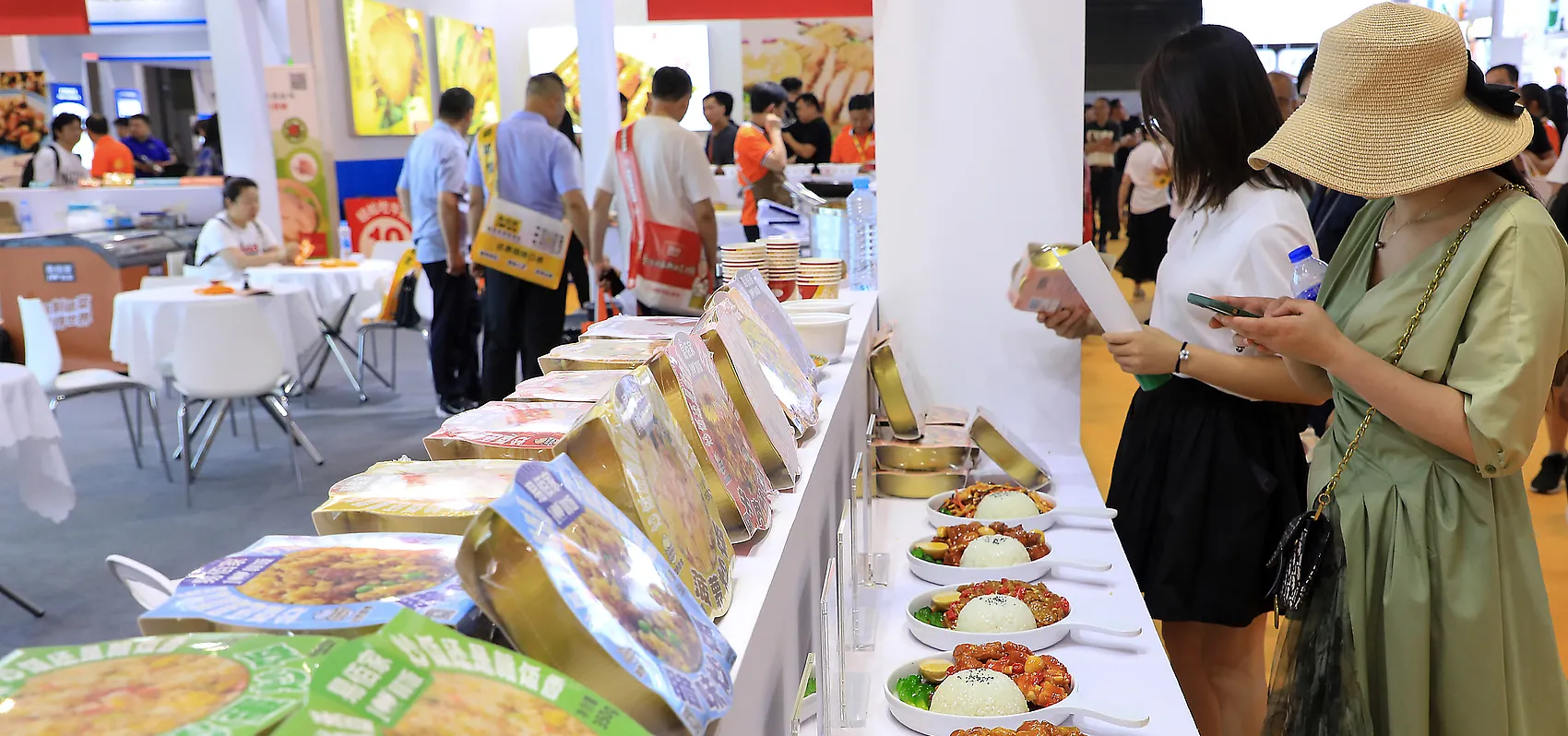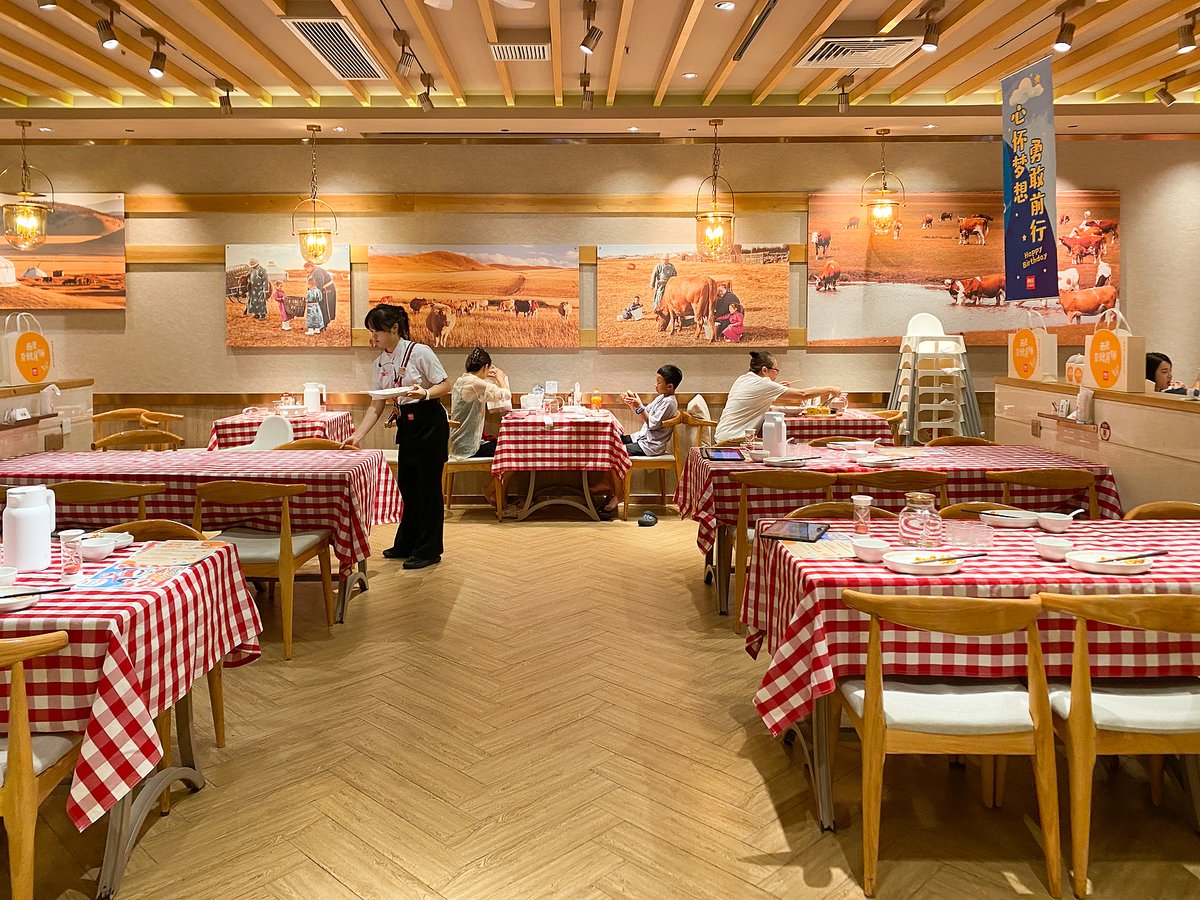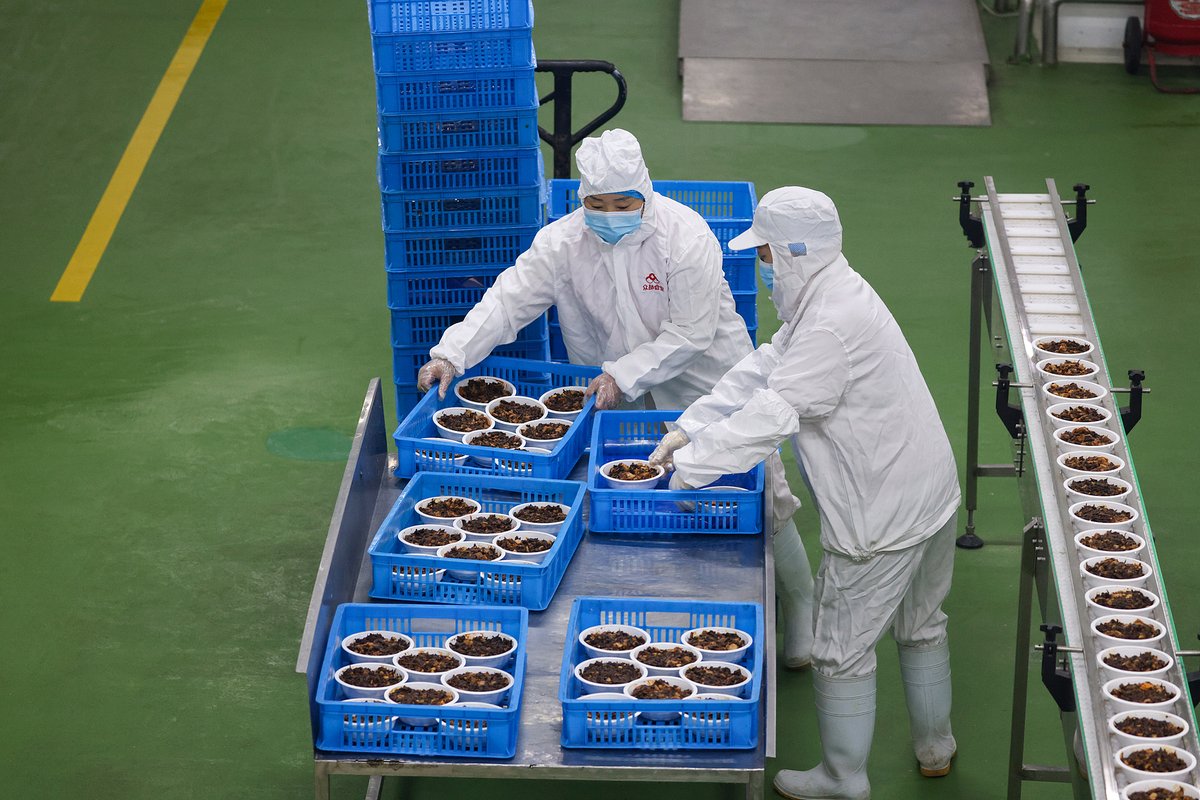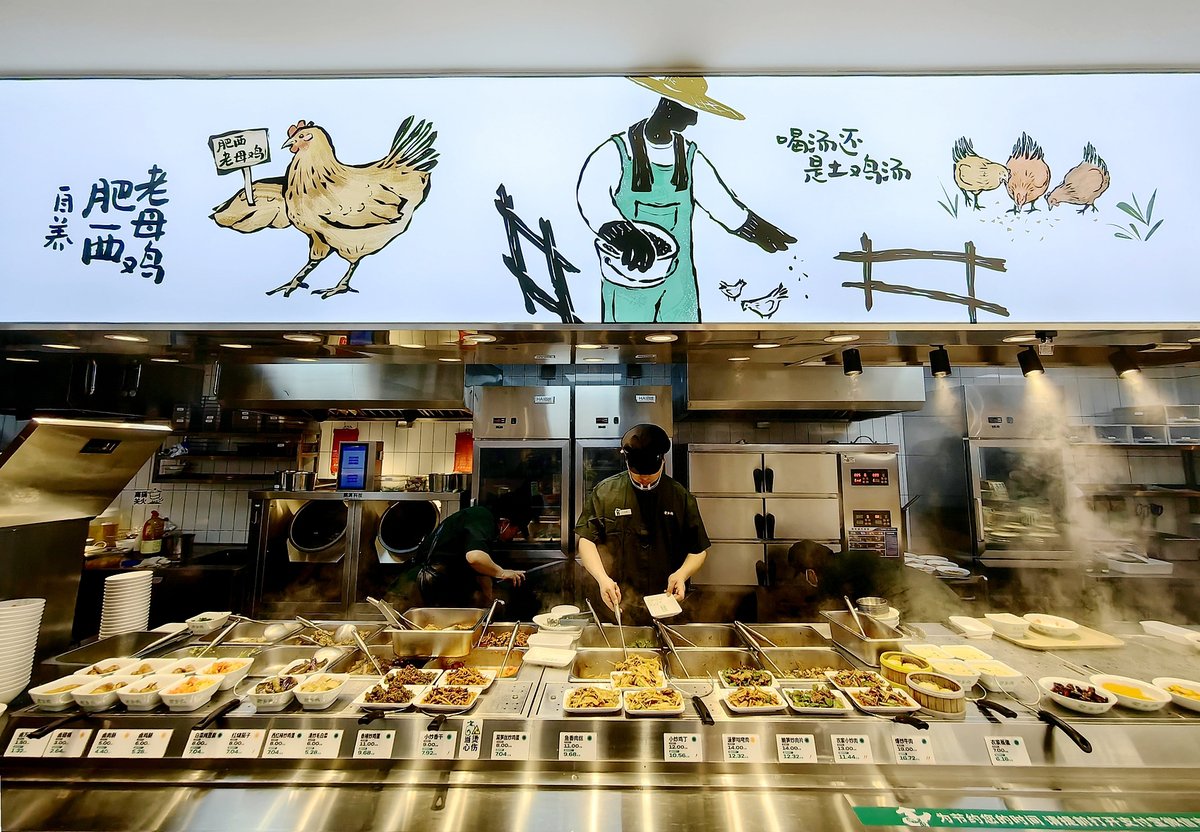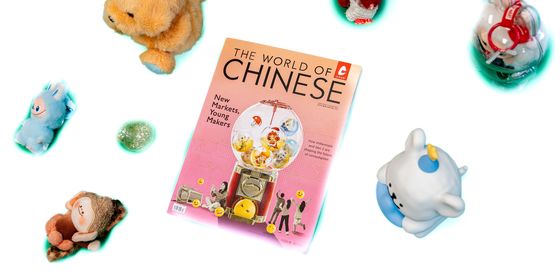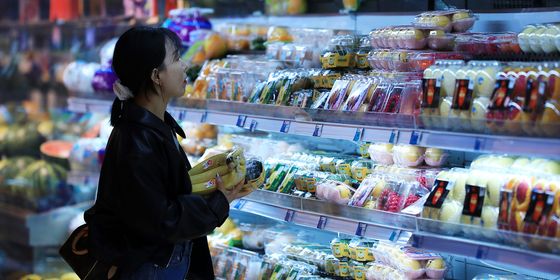A single complaint from a tech entrepreneur about a popular restaurant chain has revived the debate over pre-made food—a development that could usher in sweeping changes to the industry
When Jia Guolong, founder of Xibei, a popular restaurant chain known for its northwestern Chinese cuisine, announced that he would open the kitchens of the chain’s 370-plus outlets in China so that consumers could inspect them—and verify his earlier claim that they do not use yuzhicai (预制菜), or pre-made dishes—he likely did not expect the exact opposite effect it would have.
Taking Jia up on his offer, reporters and visitors livestreamed their kitchen tours, discovering packaged frozen items such as fish, meat, and soup with shelf lives of up to two years. The revelations further fueled public backlash against the restaurant and intensified the debate over transparency in the sector, including everything from the definition of “fresh” to pricing and food safety.
“I watched the livestream—the lamb chops have a shelf life of 24 months!” read the most-liked comment under Xibei’s official account on microblogging platform Weibo on September 12, the first day of its open-kitchen stunt. “The roasted fish is frozen too, and lasts for 12 months! If this does not count as pre-made, then nothing does.” Another phrase circulating online drove the point home: “One-year-old kids eat two-year-old broccoli,” ridiculing the shelf life of frozen broccoli used in the chain’s children’s meal sets, one of its specialties alongside northwestern Chinese dishes.
Read more about the food industry in China:
- Beyond the Cup: How Instant Noodles Evolved with China
- Prepared to Fail: Cafeterias and Restaurants Face Backlash for Pre-Made Meals
- Can Anything Save China’s Fast Food Brands?
The backlash was ignited by Luo Yonghao, founder of tech company Smartisan and top livestreamer of e-commerce platform Jiao Ge Pengyou (“Make a Friend”). After dining at a Xibei restaurant on September 10, the celebrity entrepreneur criticized it for selling “almost all pre-made, and expensive, dishes,” adding it was “truly disgusting” and urging that national rules be established to require clear labeling.
Several rounds of heated exchanges between him and Jia followed online. Jia immediately deemed Luo’s accusation as “defamatory” and vowed to sue. “Our stores do not serve pre-made dishes, in accordance with national regulations,” Jia insisted in an interview with Shanghai-based media The Paper on September 11, emphasizing the distinction between “pre-processed food” and “pre-made dishes.” For example, he said, preparing lamb chops at a central kitchen to be cooked at restaurants is “entirely different from” pre-cooked frozen meals that only require preheating.
Many industry insiders backed Jia’s claim, citing a March 2024 notice on regulating and promoting the pre-prepared food sector jointly released by authorities including the State Administration for Market Regulation (SAMR), the Ministry of Commerce, and the National Health Commission. The document gave the first official definition of yuzhicai: “meals made from one or more edible agricultural products and their derivatives, with or without added seasonings or other ingredients, and without preservatives. They undergo industrial pre-processing—such as mixing, marinating, tumbling, shaping, stir-frying, deep-frying, roasting, boiling, or steaming—and can only be consumed after heating or cooking.” The category explicitly excludes frozen staple foods like flour- or rice-based products and instant meals, as well as ready-to-use cleaned and prepped ingredients, “semi-finished foods,” and “finished foods” prepared at central kitchens.
As for frozen food items, Xibei’s employees told Southern Weekly that the quick-freezing of meat such as mutton “can preserve moisture and flavor to the maximum extent, allowing for a longer shelf life,” while freezing vegetables can “eliminate insect eggs, ensure a stable year-round supply, and lock in freshness.”
These guidelines, however, differ from public perception of pre-prepared food and traditional ideas of what constitutes fresh and healthy ingredients, as reflected in netizens’ complaints on Xibei’s Weibo account, and their dining choices. In an interview with China Entrepreneur magazine on September 12, Jia said that Xibei’s total daily turnover could fall by 2 to 3 million yuan—more than the accumulative losses in the two days following Luo’s complaints—calling it the “greatest external crisis” in his 37-year career since founding a humble snack shop in the northern Inner Mongolia region.
The fallout also carries broader implications for the industry as a whole. A 2022 report by the China Chain Store & Franchise Association and financial institution China Renaissance showed that 85 percent of the yuzhicai industry’s output—from instant food and ready-to-use cleaned and prepped ingredients to finished food, with a total market value of over 300 billion yuan—was destined for restaurants. Meanwhile, pre-prepared food made up 80 percent or more of the menu at well-known brands like Real Kungfu and Xibei.
While more consumers have embraced pre-prepared food for its reliable flavor, convenience, and lower price—driving sales on e-commerce platforms like JD.com and Taobao—the majority remain cautious, their trust eroded by repeated food scandals and a lack of regulations and transparency in the industry. For instance, this September, several parents in Shanghai complained that the shrimp in their children’s canteen smelled odd. Soon, netizens reported that the same lunch provider was serving frozen beef and lamb with an 18-month shelf life to another school via a central kitchen. The case is under investigation.
Luo’s complaints about Xibei’s “expensive” pre-made meals—averaging around 85 yuan per person, around 50 percent higher than other northwestern-specialty restaurants, according to catering industry platform Canyin88—and his call for consumers’ right to know whether pre-made food is used, have revived similar demands. Several state media outlets, including People’s Daily and Xinhua Net, endorsed such calls in recent editorials. In particular, Luo also highlighted fast food chain Home Original Chicken, or 老乡鸡 in Chinese—which labels dishes from a central kitchen and those freshly cooked on site—as a model for other restaurant brands to learn from.
Five days after Luo’s initial post, Xibei issued an apology, announcing on September 15 that eight of their menu items would be freshly prepared on site rather than frozen and reheated. It also pledged to work with suppliers to safeguard safety and shorten the shelf life of frozen items. While many restaurants have started livestreaming their kitchens for posterity, others, such as hotpot chain Haidilao and Jiangnan cuisine chain Green Tea, have quietly removed signs claiming “no yuzhicai” and begun labeling dishes. In late September, the authorities also announced plans to draft rules for pre-made meals, including improved labeling standards.
After the announcement, Luo admitted on Weibo that he did not anticipate the “butterfly effect” of his complaints, but did welcome one netizen’s proposal to nominate him for this year’s “Man at His Best” award in Esquire magazine.
China’s New Wave of Backlash Against Pre-Made Food is a story from our issue, “Urban Renewal.” To read the entire issue, become a subscriber and receive the full magazine.





